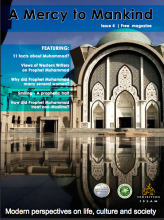The Prophet of Mercy Website
Muslim World League - Global Commission for Introducing the Messenger
In accordance with the agreement already concluded, the Jews would be obliged to evacuate Khaibar, but they were anxious to keep on cultivating the rich soil and fine orchard for which Khaibar was famous. They, therefore, approached the Prophet (Peace be upon him) with the request that they be allowed to cultivate their lands and they would give half of the produce to the Muslims. Muhammad (Peace be upon him) was kind enough to accede to their request.
The Messenger (Peace be upon him) divided the land of Khaibar into two: one half to provide the food to be stored in case of any accidental calamity that might befall the Muslims, and for entertaining the foreign delegates who started to frequent Madinah a lot; the other half would go to the Muslims who had witnessed Al-Hudaibiyah event whether present or absent. The total number of shares came to 36, of which 18 were given to the people above-mentioned. The army consisted of 1400 men of whom were 200 horsemen. The horseman was allotted 3 shares and the footman one.
The spoils taken at Khaibar were so great that Ibn ‘Umar said: “We never ate our fill until we had conquered Khaibar.” ‘Aishah (May Allah be pleased with her) is narrated to have said: “Now we can eat our fill of dates.”
On their return to Madinah, the Emigrants were able to return to the Helpers of Madinah all the gifts they had received. All of this affluence came after the conquest of Khaibar and the great economic benefits that the Muslims began to reap.
The conquest of Khaibar coincided with the arrival of the Prophet’s cousin Ja‘far bin Abi Talib and his companions along with Abi Musa Al-Ash‘ari and some Muslims from Abyssinia (Ethiopia).
Abu Musa Al-Ash‘ari narrated that he and over fifty companions, while in Yemen, took a ship which landed them in Abyssinia (Ethiopia) and they happened to meet there Ja‘far and his companions. He said, “We stayed together until the Prophet (Peace be upon him) sent an envoy asking us to come back. When we returned, we found out that he had already conquered Khaibar, yet he gave us our due shares of the spoils.” The advent of those men came at the request made by the Messenger of Allâh (Peace be upon him) to Negus, king of Abyssinia (Ethiopia), through a Prophetic deputy, ‘Amr bin Omaiya Ad-Damari. Negus sent them back, 16 men altogether with their wives and children on two boats. The rest of emigrants had arrived in Madinah earlier.
In the same context, Safiyah, whose husband Kinanah bin Abi Al-Huqaiq was killed for treachery, was taken as a captive and brought along with other prisoners of war. After the permission of the Prophet (Peace be upon him) was sought, Dihyah Al-Kalbi chose one of them and she happened to be Safiyah. The other Muslims, however, advised that Safiyah, being the daughter of the chief of Bani Quraiza and Bani Nadir, should be married to the Prophet (Peace be upon him), who agreed to their opinion, invited her to Islam, freed and took her as wife on her embracing Islam. The wedding feast consisted of dates and fat, and was held on his way back to Madinah at a spot called Sadd As-Sahba’.
******






